|
The best thing about being a parent is finding joy in the moments that your child is laughing, playing, and having fun. It’s joyous and fulfilling; and there is no greater feeling. There are other times when parenting is hard--full of so many sacrifices and tough decisions that make it feel like the farthest thing from a perfect scenario. My toddler is two years old and pretty expressive about what he wants and needs. His favorite phrases right now are: “I want fruit snacks” and “New truck show.” Depending on the answer to his requests, he’s either overjoyed or devastated. He will curl into a ball with his head on the floor at my feet or just burst out into a shrieking scream of anger. I think for most parents, it’s hard to see your child struggle. While it’s important for him to learn lessons like “not-right-now,” teaching him and working through these times of struggle are not fun parts of the vocation. I’d like to think that God, our very compassionate, perfect Father, watches over us in our many struggles and is the kind of parent beside us in our tantrums, too. The weight of parenthood doesn’t affect our Father. Instead, he is the one who strengthens us, the stressed-out parents, when we ask for his help in prayer and let him in.
Jesus is the Son of the Father. When he taught his disciples to pray, he gave us the Our Father prayer. In each of these lines, we can find solace in praying to our Father in heaven. There is such beauty in the words from Christ that capture every essence of our Gospel. Our Father, Who art in heaven, Hallowed be Thy Name. Thy Kingdom come. Thy Will be done, on earth as it is in Heaven. Give us this day our daily bread. And forgive us our trespasses, as we forgive those who trespass against us. And lead us not into temptation, but deliver us from evil. Amen. Let’s go through the prayer and break it down a little more:
By the end of the Lord’s Prayer, I see a loving, forgiving, and omnipotent parent. I feel like God is supporting me and guiding me. He is inviting me to have faith in what he wants for me and my life. The Our Father also reminds me to be grateful each day, to forgive others, and to allow myself to be forgiven, most importantly in Confession. A parent’s life is sometimes consumed by their child or children. With God’s help, we can live out our vocations as parents by looking to his example of Fatherhood. God in His Wisdom created us to be His. He made us unique, with a capacity to love and with Free Will. He made us to be thinkers and creators. He loves us so much that he brought his Son into the world to die for our sins and then be able to live with him eternally. I can’t imagine a more perfect parent than that.
0 Comments
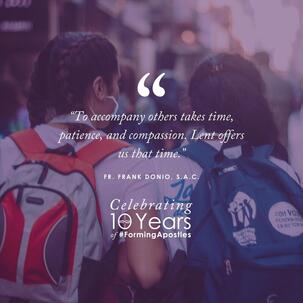 “Lent came quickly!” How often have we said or heard these words? No matter how fast it seems to come, Paul Jarzembowski in his new book, Hope from the Ashes: Insights and Resources for Welcoming Lenten Visitors, notes that, “Lent serves as an opportunity for our personal renewal toward holiness –to assess and reform our habits and routines, to mend relationships with God and others” (29). Our focus, though, is not simply on ourselves and our growth in holiness. The Lenten season offers us the opportunity to welcome and accompany others, especially those who join our faith communities, particularly on Ash Wednesday. Jarzembowski offers that “Ash Wednesday is like a laboratory for learning the ‘art of accompaniment’ (Evangelii Gaudium, 169)” (184). To accompany others takes time, patience, and compassion. Lent offers us that time. Prayer and fasting help us practice patience. Almsgiving, which includes our valuable time, helps us grow in compassion –suffering with others. Lent is journeying together, which is what being synodal is about. Many are isolated and alone; we are called to accompany them into deeper life in Christ in and through the Church. May our Lenten journey together lead us to an Easter of deeper personal holiness and greater accompaniment of all. May the Charity of Christ urge us on! In God, the Infinite Love, Fr. Frank “And so I say to you, you are Peter, and upon this rock I will build my church, and the gates of the netherworld shall not prevail against it.” -Matthew 16:18 Today, the Church celebrates the Feast of the Chair of St. Peter. While there is an actual chair of St. Peter, the feast doesn’t commemorate the physical chair which is suspended on the back wall of St. Peter’s Basilica above the Altar of the Chair. That chair is said, by tradition, to have belonged to St. Peter when he was Bishop of Rome. The famous Baroque artist Gian Lorenzo Bernini enclosed the original chair in gilded bronze in the mid-17th century and it now sits beneath the famous stained glass of the Holy Spirit in St. Peter’s. No, today’s feast doesn’t commemorate that specific chair, but the Pontificate itself, that “Christ the Lord… made Peter and his successors His vicars, to exercise for ever in the Church the power which He exercised during His mortal life,” (Statis Cognitum). As we read in the passage from the Gospel of Matthew, Jesus Christ has not only built his Church upon Peter, and his successors, but has promised us that the gates of Hell will not prevail against her. The pontificate, as Pope Leo XIII says in Satis Cognitum, is a beautiful expression of the Church’s unity. The Successor of St. Peter is not meant to, in any way, supersede our Lord Jesus Christ, but is an expression of his Kingship which is eternal: The nature of this supreme authority, which all Christians are bound to obey, can be ascertained only by finding out what was the evident and positive will of Christ. Certainly Christ is a King for ever; and though invisible, He continues unto the end of time to govern and guard His church from Heaven. But since He willed that His kingdom should be visible He was obliged, when He ascended into Heaven, to designate a vice-gerent on earth. It is in the successors of Peter that this authority given to Peter himself continues in the life of the Church. “It is consequently the office of St. Peter to support the Church, and to guard it in all its strength and indestructible unity.” This feast is not only a beautiful opportunity to celebrate the pontificate as a manifestation of Christ’s kingship in our Church and a supreme example of unity amongst the Christian people, but it’s also an opportunity to celebrate and pray for our current pope! Pope Francis continues his Petrine ministry, nine years after his election in 2013. The Holy Father has provided a refreshing pastoral vision for the Church, from top down, that focuses on mercy, compassion, and radiating the love of Jesus Christ. He has asked all of us, clergy and lay, to reflect upon, discern, and act on our Universal Call to Holiness and our vocation as Missionary Disciples. This word alone, a product of Pope Francis’ cornerstone document of his pontificate, Evangelii Gaudium, calls us out of a purely inward-looking faith that seeks personal growth in holiness devoid of evangelization and leads the baptized to reflect upon our baptismal call to be missionaries commissioned to share the Good News! On this Feast of the Chair of St. Peter, let us ask those Holy Roman Pontiffs who intercede for us in heaven to pray for the Church and her unity, and let us pray for Pope Francis as well—that his ministry may continue to unite the Church and always reflect the kingship of Christ which is made manifest most clearly in our weakness, vulnerability, and service. To learn more about Pope Francis and his pontificate, please visit our Pope Francis Portal.
One of the greatest gifts of Pope Francis’s pontificate is our pope’s willingness to write and speak about the day-to-day realities of many people everywhere. However, there is one experience which Pope Francis writes about that resonates with me most strikingly as a young adult and young professional: anxiety. And, according to the National Alliance on Mental Illness (NAMI), I am probably not the only person with whom Pope Francis’s words resonate. In 2020, an estimated 48 million people experienced an anxiety disorder. Anxiety and anxiety disorders exist on a spectrum, ranging from mild interference with professional, relational, and/or other aspects of a person’s life, to causing major difficulties performing basic functions of human life. In other words, anxiety can look like worrying about an upcoming meeting to the extent that it causes racing thoughts and accelerated heartbeat or it can look like a debilitating fear that causes avoidance of daily plans and activities altogether. So, what does Pope Francis have to say about this wide-ranging experience that shows up in the lives of so many? In his 2018 Apostolic Exhortation, Gaudete et Exsultate, Pope Francis sees anxiety as something that can cause us to act for the wrong reasons: “Needless to say, anything done out of anxiety, pride or the need to impress others will not lead to holiness. We are challenged to show our commitment in such a way that everything we do has evangelical meaning and identifies us all the more with Jesus Christ.” Here, Pope Francis identifies that the worries, racing thoughts, and fears can thwart our best judgment and right intentions. Experiencing anxiety can cause us to miss the mark in our perceptions of others, ourselves, or certain situations. Rather than coming from a place of a collected and balanced mindset, we may be influenced by anxiety to choose to act out of fear or worry. In his 2013 Apostolic Exhortation, Evangelii Gaudium, Pope Francis shares a similar sentiment. When describing the patience and time it takes to promote the common good of a society in paragraph 223, our pope encourages, “What we need, then, is to give priority to actions which generate new processes in society and engage other persons and groups who can develop them to the point where they bear fruit in significant historical events. Without anxiety, but with clear convictions and tenacity.” Here, Pope Francis follows a similar thought to Gaudete et Exsultate: anxiety clouds our judgment and perceptions—preventing us from taking clear steps forward in difficult situations or relationship challenges. Perhaps Pope Francis’s punchiest paragraph on anxiety comes from Christus Vivit. In paragraph 142, he cautions young people and the entire church in falling prey to the fear and paralysis that comes from anxiety: “Keep following your hopes and dreams. But be careful about one temptation that can hold us back. It is anxiety. Anxiety can work against us by making us give up whenever we do not see instant results. Our best dreams are only attained through hope, patience and commitment, and not in haste. At the same time, we should not be hesitant, afraid to take chances or make mistakes. Avoid the paralysis of the living dead, who have no life because they are afraid to take risks, to make mistakes or to persevere in their commitments. Even if you make mistakes, you can always get up and start over, for no one has the right to rob you of hope.” Here, Pope Francis highlights how anxiety can prevent us from moving forward. How often are we afraid to pick up the phone and call a friend that we haven’t spoken to in a while because we are anxious about what to say? Or how many times have we put off a difficult conversation because we are fearful about how it might change our relationship with the other person with whom we speak? How many times have we passed up applying for that school, a certain job, or taking on a particular project because we are afraid that our abilities wouldn’t measure up? For Pope Francis, many of these situations have anxiety at their root. So, what can we make of how Pope Francis writes about anxiety? For our pope, anxiety is a difficult and challenging issue. Though Pope Francis mentions anxiety can affect a person’s life negatively, notice that he never mentions anxiety as sinful. Like other health and mental health conditions and experiences, anxiety itself is not a sin and is not a punishment for sin, but rather comes from our imperfect human nature. What Pope Francis does hint at, though, is that learning to live with anxiety contributes to our holiness. How does learning to live with anxiety contribute to our growth in holiness? Learning to manage our anxiety—whether through a relationship with a licensed therapist, medication, self-care practices, or other means of support—allows us to live out our calling to holiness more freely and generously. Anxiety causes us to make decisions, act, and cope with the situations of life out of worry, nervousness, and fear. Managing our anxiety allows us to learn to live more mindfully and intentionally, gain insight into what is causing our fear and worry, and make choices to act from a place of balance and discernment. In other words, instead of being paralyzed by anxiety, learning to manage it allows us to respond to others and situations in our lives more thoughtfully—seeing them not as threats or reasons to make judgments out of fear, but opportunities for us to be drawn out of ourselves, despite our nervousness or fear. If holiness means to set apart our lives for God’s action and living out our mission, our experience of anxiety can be a part of our vocation to holiness as we see it as an opportunity to grow, become more generous, place our trust in God, and challenge our fears. As Pope Francis encourages us in paragraph 143 of Christus Vivit, “Take risks, even if it means making mistakes. Don’t go through life anesthetized or approach the world like tourists. Make a ruckus! Cast out the fears that paralyze you, so that you don’t become young mummies.”
If you haven’t heard by now, yesterday was Valentine’s Day—a day that solicits cheers and jeers from so many. Our culture reminds us that Valentine’s Day is the day to show love to your friends and family. If you walked into any retail store, I’m sure you were bombarded with Valentine’s Day sales, candies, cards, flowers, etc. all reminding us that love (and several shades of red) is supposed to be celebrated on this particular day. I’m not here to give you the history of Valentine’s Day or the particular saint (or non-saint) it may be based on. If you want to read more about the Catholic history of this celebration, feel free to click here. I’m here to remind you of something that I feel very strongly about: love is meant to be shown every day, to be celebrated every day, not just one day a year. Oftentimes the “valentines” that are exchanged contain the term “Will you be mine?” We should remember that no one is ever alone on Valentine’s Day. Everyone has a valentine. Jesus Christ is the single most important valentine that we have and I guarantee you, he doesn’t get many cards (perhaps people just think he’s allergic to chocolate). We should take comfort in the fact, however, that we are taking time out of our usually hectic lives to acknowledge that we all share love with someone. My only piece of advice is to not let it end when the chocolates are gone, or after the cards are exchanged. We should continue to express the affection we have to the people in our lives who are always there for us, who know us best, and oftentimes feel the same way about us, every day. Let us not also forget that Jesus shows us his love everyday as well and follow his example. As we celebrate love on Valentine’s Day, I also hope that you take the time to express some love this week with concrete actions. Call your parents, your grandparents, your husband or wife, catch up with friends you haven’t spoken to in a long time - reach out and remind them that you love them today and every day. **This post was originally published on 2/13/2013.
“The LORD will fight for you; you have only to keep still.” -Exodus 14:14 There is something so comforting about the feeling of warm water. I revel in it every time I absentmindedly wash another dish or hop into the shower. The latter, especially, has become a type of mini-retreat for me. I turn the water to just under scalding and sneak away after my children’s bedtime for what has become a time of personal prayer. Here, there are no diapers to change, no sibling qualms to suppress, no crumbs to pick up, no stains to spray. There is only me, the water, and God. Sometimes, I choose to put on some favorite songs or hymns. Other times, an insightful podcast will do. But most of the time, I just crave the silence that cascades all around me, washing the ups and the downs, the moments of peace and frustration, away. It’s not haphazardly that the Church uses water in the sacrament of Baptism. And it’s not coincidental how soothing and renewing a warm bath or shower can be. From the beginning of time, God has used water to make things new. In the story of Creation, his spirit hovers above the waters and creates order and beauty out of chaos. In the story of Noah, he cleanses the earth of sin through water and creates the world anew—giving humanity a fresh start. In the story of the Exodus, the Israelites pass through the water of the Red Sea from slavery into freedom. And at the Cross, Christ pours out blood and water from his side to give birth to the Church and open the doors of salvation. It is for these reasons that water is so significant in the sacrament of Baptism. Throughout salvation history, God has used water to create order out of chaos, cleanse us of our sin, lead us from spiritual slavery to freedom, and incorporate us into the Church as his sons and daughters. Baptism does all of these things. It is the first sacrament of initiation and the most life-changing event we will ever encounter—more life-changing even than our birthdays, wedding day, ordination day, or the day we may become parents. The other sacraments, life-changing and beautiful as they are, cannot occur without us first being baptized. As the Catechism explains, “Holy Baptism is the basis of the whole Christian life, the gateway to life in the Spirit (vitae spiritualis ianua),4 and the door which gives access to the other sacraments” (1213). Furthermore, Baptism fundamentally changes our identity. St. Paul explains in Ephesians 4:22-24 that in Baptism we “put away the old self of your former way of life…and put on* the new self, created in God’s way in righteousness and holiness of truth.” A few weeks ago, as we entered into the second week of Ordinary Time, we heard another story with water: the story of the Wedding Feast at Cana. In this case, God takes water, an ordinary, natural element, and changes it into something new. Where there was lack, he created abundance. He continues to do this today -- a thought that gives me hope during trying times. After a week of illness in our immediate family, the loss of an extended family member, elevated sibling rivalry, communication breakdowns, a close friend in the hospital, general isolation, and a stolen credit card (for good measure), I find myself in the bathtub once more—slowly breathing, closing my eyes, and praying: make me new. With ragged emotions, a fried brain, and a heavy heart, I whisper, “Lord, I have nothing to give.” Like the jars of wine at Cana, I am empty. How fortunate for us that this is the area of God’s specialty: our weakness. Only weeks ago at Christmas we marveled at this in a special way as God physically entered into our frailty in the frailest of forms—as an infant. Now we hear about this God-man beginning his ministry by providing an extravagant amount of wine at a wedding. God doesn’t skimp. And as I breathe in and out slowly in the water, I remember the truth of who God is and what he has done. He can take my chaos and make order and beauty. He can take my slavery to sin and my ego and free me to love. He has incorporated me into his family. And every time I choose to participate in the sacraments and live out my baptismal identity, he makes me new by filling me with his grace. If you, too, are feeling tired, sick, overwhelmed, or stressed, I invite you to remember in prayer, “The LORD will fight for you; you have only to keep still.” On this day in the Church, we celebrate the life of St. Blaise who was a healer, evangelist, and a martyr. In churches worldwide, we come forward at Mass on Feb. 3rd for a blessing from St. Blaise to be healed of any throat ailments and other illnesses. He lived his life in devoted service to the Lord and suffered a martyr’s death because he refused to denounce God and abandon his faith. He was willing to die rather than forsake all that was important to him. As we reflect on this saint and the impact of his life in the history of our Church, it is a perfect time to examine our own lives. As we come out of celebrating Christmas, the beautiful season of light, and walk in Ordinary Time, it is a great time to examine our level of commitment to discipleship and keeping Christ at the center of our lives. Are we totally and completely invested in following our Lord and Savior in every aspect of our life – no matter the cost? We have the remarkable example of holy men and women who are now saints to remind us that we are purposed to love, serve, and glorify the Lord in all we do, think, and say. In a recent Sunday’s Gospel, Mary instructs the servants at the wedding feast to “do whatever He tells you.” These are the last recorded words the Blessed Mother speaks in the holy Scriptures. This is significant and her instruction is relevant to us today. If we live each day asking God what He wants of us, we will be fulfilled beyond all our imagining. When we follow the path God sets before us, we gain more freedom, not less. When we die to ourselves and our wants, we become more whole, more alive. When we love extravagantly, we become more energized, not worn out. When we are more generous with our time, our talents and resources, we amazingly gain more time to do more things for the Lord. When we cooperate with His plan – everything good is multiplied in our lives. God calls each of us to become saints, one day at a time, in the grind and messiness of life. We just need to be intentional about listening to His voice prompting us in all the opportunities He provides. This will sanctify us and bring us true joy. It’s important to hear this because the world screams the opposite message. As I write this, I am in the midst of adjusting to grown children leaving our home and repurposing bedrooms and discovering more time to focus on other activities. I am tempted to enjoy more things that are fun, which is good within reason. I can conjure up endless projects that I never had the time to pursue while raising six kids, working, and administering a household, but I have to ask – is this what God wants me to do? Since Christmas, I have been reflecting on all these life changes in my heart and asking for clarity in my purpose in this season of my life. And as always, God does not disappoint. He has been drawing me to more prayer time and daily Mass – and bringing to mind all those I can bring to the altar to pray for. He has clearly shown me how important it is to share more time with my husband – recreating together, talking, and sharing our ideas of what we can do as a couple in this stage of our life to build up the Body of Christ. He has brought to mind the vows I spoke 42 years ago and how I can more deeply live them out today. He specifically reminds me to always choose the most loving thing as I continue to live my vocation as wife and mother. He shows me so many ways to be available to my family and those around me. I am drinking deeply from the well of God’s love, grace, and mercy, finding that opportunities abound for me to live out my discipleship in new and exciting ways. And he gives me refreshment and joy that settles deep in my soul. I encourage you all, in these Ordinary days of the liturgical year, to take some quiet time to search your heart, mind, and spirit to see how you are doing in the Lord’s service. Are you 100% on board with practicing your faith in your relationships, in your encounters with others, in your thought life, and in all your behavior? Making an honest assessment, then asking the Lord and all the saints to help bolster your courage, strengthen your efforts, and fortify your energy to be the disciple you were called to be will lead you to become transformed into someone extraordinary for God! “This is my prayer: that your love may increase ever more and more in knowledge and every kind of perception, to discern what is of value, so that you may be pure and blameless for the day of Christ, filled with the fruit of righteousness that comes through Jesus Christ, for the glory and praise of God.” Phil 1: 10-11 As we continue into the second month of 2022, let us learn from the saints we celebrate this February. While this is a shortened month, there are three instances this month where we get to celebrate two saints on the same day. On February 8th, we will celebrate both St. Jerome Emiliani and St. Josephine Bakhita. Then, two days later, we celebrate both St. Scholastica and St. Jose Sanchez del Rio. Finally, on February 21st, we celebrate both St. Peter Damian and Bl. Richard Henkes. May their witness of the faith inspire us to follow in their footsteps and grow in our faith throughout the month. February 8th One of the saints who we will celebrate on February 8th is St. Jerome Emiliani. After his conversion of heart as a prisoner of war, he worked tirelessly for orphans and the poor in his community. He founded the Somaschi Fathers who, even today are committed to helping orphans, the poor, and the sick. He became well known for his zeal and his work has continued now almost 500 years later. On the same day, we will also celebrate St. Josephine Bakhita. She was born in 1869 in Sudan. As a child, Bakhita was forced into slavery. Eventually she ended up in Italy where she was freed and converted to Catholicism. She then became a Canossian Sister and devoted the rest of her life to her faith. Throughout her life, she was known as a role model for forgiveness and continuing to grow in her faith. February 10th One of the saints whose feast is on February 10th is St. Scholastica. St. Scholastica is known as the twin sister of St. Benedict, the founder of the Benedictines. Once a year, St. Scholastica and her brother would meet and discuss many aspects of the faith to help each other and the other Benedictines in their care. Their strong relationship continued until St. Scholastica’s death, just three days after her annual visit with Benedict. Because of her work with her brother, St. Scholastica is now the patron saint of Benedictine nuns. Living almost a century and a half later was St. Jose Sanchez del Rio. During the Cristero War in Mexico, Jose was captured and tortured to try and get him to renounce his Catholic faith. However, Jose remained committed to his faith and was martyred at the age of 14. I find it incredibly inspiring that both St. Scholastica and St. Jose Sanchez del Rio became saints even though their lives were so different. Their examples show that God calls each of us to sanctity in a unique way. February 21st St. Peter Damian lived in the 11th century and came from very humble beginnings. He was orphaned at a young age and spent most of his childhood uneducated and underfed. Eventually, one of his brothers took him in to be educated. Peter proved incredibly gifted in theological matters. He spent his life as a monk engaged in theological disputes during a challenging period in the Church. Today, St. Peter Damian is recognized as a Doctor of the Church, showing that his initial lack of education did not define the rest of his life – skilled theologians can come from anywhere. Also celebrated on February 21st is Bl. Richard Henkes. Bl. Richard Henkes was a Pallottine priest who was initially arrested by the S.S. in 1938 for speaking out against Nazism. Even after he was released in 1939, he continued preaching against the Nazi regime. After being arrested a second time and sent to the Dachau concentration camp, he volunteered to care for the sick there. Father Henkes ultimately became ill, dying from the disease. He is remembered for his unending selflessness. As we continue in 2022, let us reflect on the lives of these saints from these three days as role models we can continue to look to throughout this month. To learn more about the saints, visit our Catholic Feast Days Website by clicking here. To view a calendar of the feast days in February, and each month, click here.
|
Details
Archives
July 2024
Categories
All
|
About |
Media |
© COPYRIGHT 2024 | ALL RIGHTS RESERVED



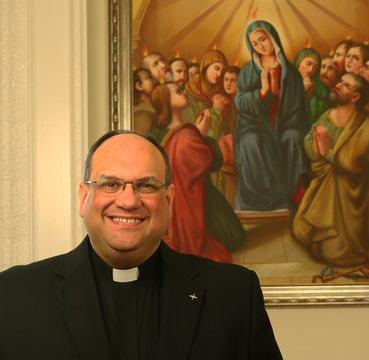
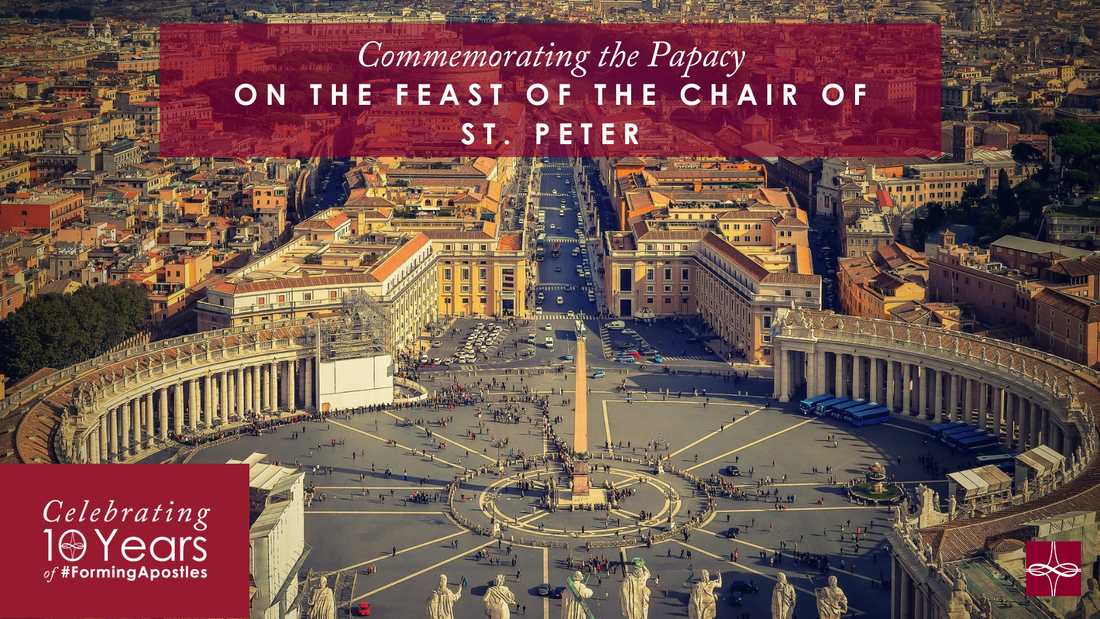
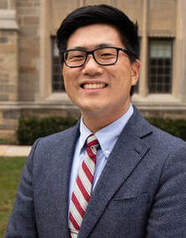
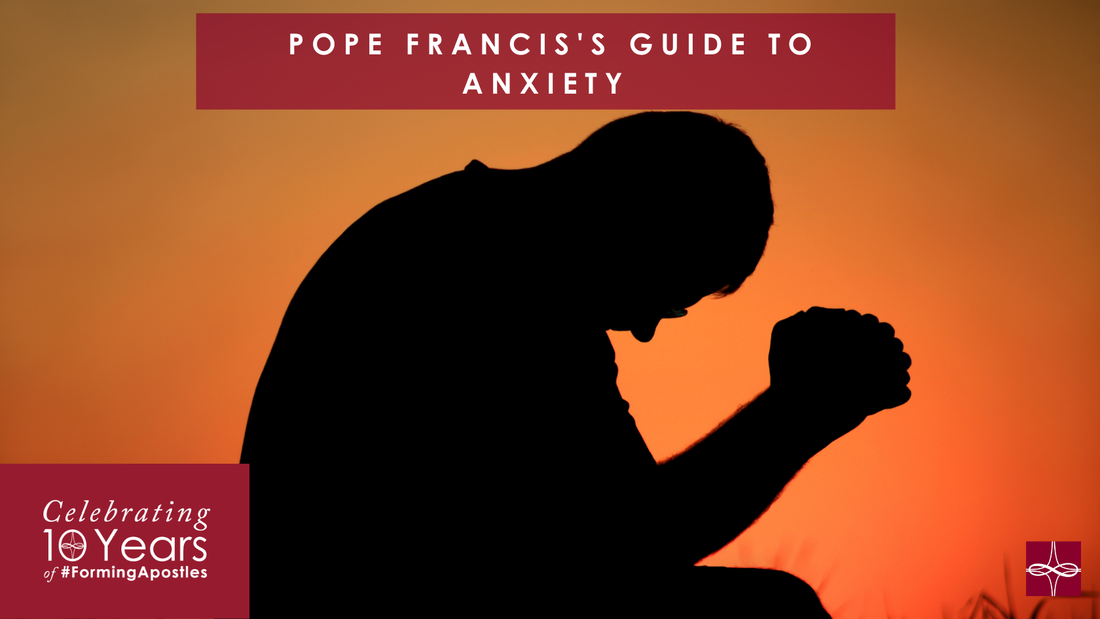
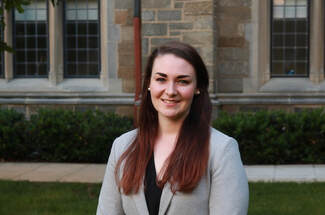

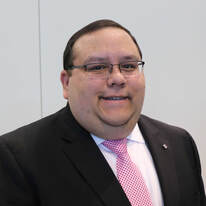


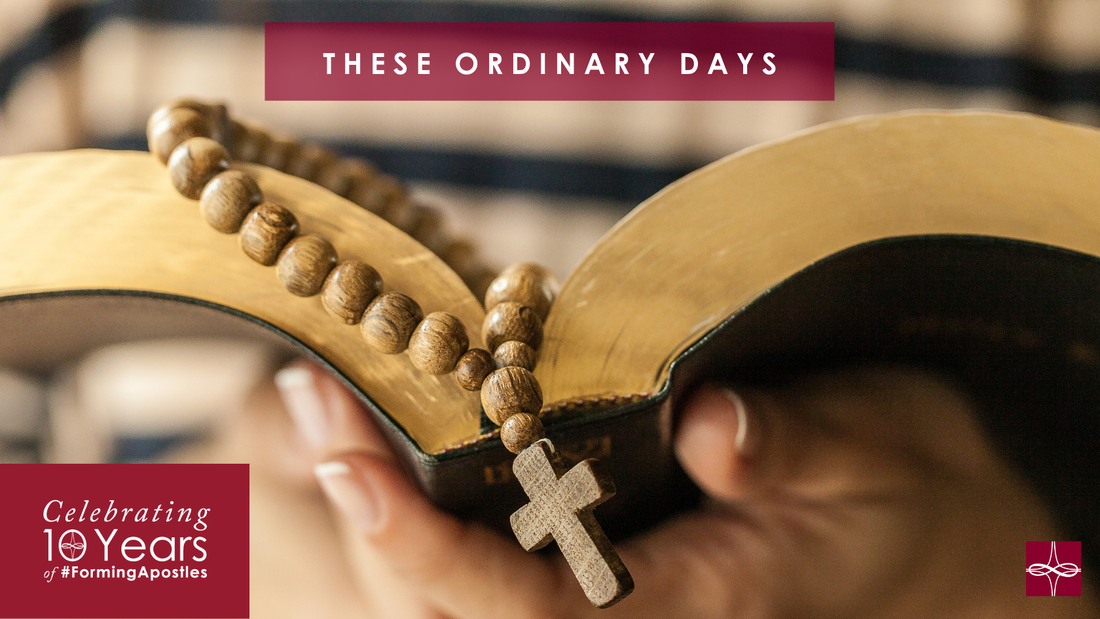

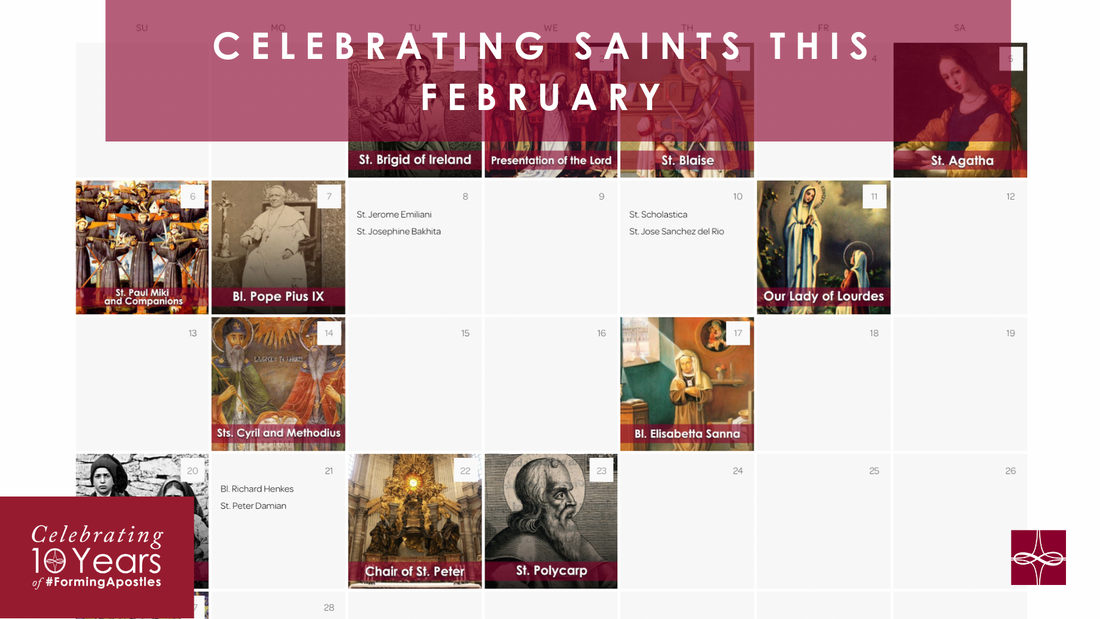

 RSS Feed
RSS Feed